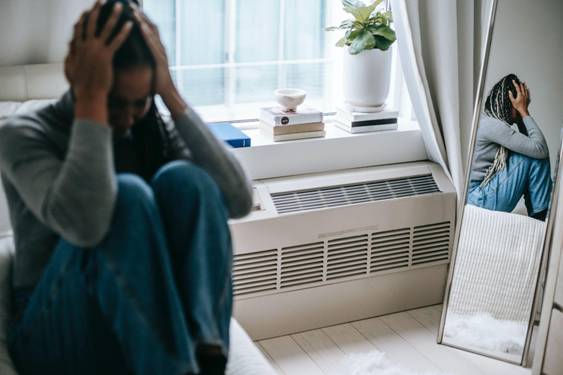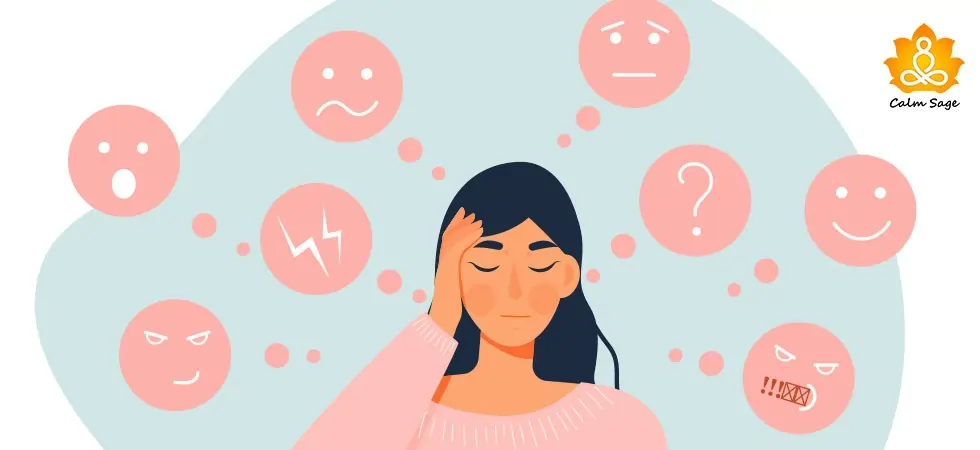The Silent Struggle: Symptoms of Silent Panic Attacks You Need to Know

Panic attacks are known for the intense and overwhelming feelings they bring with them. Panic attacks and anxiety attacks can be identified with symptoms such as fast heartbeats, shortness of breath, shaking and trembling, and feeling an impending sense of doom. Yet, there is a variant of panic attacks that often goes hidden because of its silent nature. Yes, you guessed it! I’m talking about silent panic attacks.
Silent panic attack episodes do not show any visible signs but can be equally debilitating and distressing as the others. If you’re experiencing silent panic or anxiety attacks, then you may feel the same distress as others who experience the more visible kinds of panic attacks.
Today, we’re delving into the symptoms of silent panic attacks, what causes them, and how you can cope with them. Let’s begin!
What Are Silent Panic Attacks?

Silent panic attacks or silent anxiety attacks are often referred to as hidden or internal panic attacks as they do not show visible or outward signs and symptoms that are often associated with panic attacks.
Instead of the more visible symptoms, you may experience intense emotional or psychological symptoms of panic attacks such as overwhelming fear, racing thoughts, derealization or depersonalization, rapid heartbeats, intrusive thoughts, headaches, and more.
Let’s take a closer look at the symptoms of silent panic attacks;
Symptoms of Silent Panic Attacks
-
Overwhelming Fear
One of the most common symptoms of a silent panic attack is experiencing an overwhelming or irrational fear. This fear you experience can be debilitating and make it harder for you to figure out the cause of the fear.
-
Racing Thoughts
Another symptom of silent anxiety or panic is experiencing racing thoughts. During a silent panic attack, the mind can become overcome with worried thoughts. These thoughts are often negative and catastrophic and can worsen feelings of fear and dread. Rapid thoughts can also cause cognitive impairment, making it difficult to concentrate or think clearly.
-
Detachment From Reality
Zoning out or feeling detached from reality is another symptom of silent anxiety that you shouldn’t ignore. Instead of visible signs of distress and unease, you may feel emotionally numb. This emotional disconnect can be truly unsettling and create a sense of derealization and depersonalization.
-
Hypervigilance
Silent panic attacks can also cause hypervigilance where you become extremely aware of the internal and physical body sensations. This heightened sense of awareness can worsen the distress you’re experiencing and start a cycle of anxiety that can be harder to let go of.
-
Physical Distress
While not as heightened as standard panic attacks, silent panic attacks can bring physical distress and sensations that can worsen your condition. These include tightness in your chest, feeling butterflies in your stomach, muscle tension, throat closing, the feeling of restlessness, headaches, and even nausea.
-
Shallow Breathing
When you experience a silent panic attack, you may become acutely aware of your breaths. This can lead you to breathe shallowly. When your brain doesn’t get enough oxygen, it can intensify the sensations caused by panic and anxiety.
-
Increased Heart Rate
Although this symptom may not be as pronounced as standard panic attacks, even then you may experience a rapid heart rate and physical discomfort when silent panic and anxiety attacks. This symptom may, however, become overshadowed by emotional and cognitive symptoms.
What Causes Silent Panic Attacks?

The causes of silent panic attacks are somewhat similar to those of standard panic attacks. Your silent panic attack may be triggered by factors such as;
- An imbalance in the brain chemistry and neurotransmitters. An imbalance in serotonin and norepinephrine can contribute to panic and anxiety.
- If there is a history of panic or anxiety disorders in your family, then it can also increase your susceptibility to panic attacks.
- Chronic stress or witnessing a traumatic event can also trigger panic attacks as your body goes into the stress response triggering the “fight or flight” response.
Why Do We Experience Silent Panic Attacks?
You can experience silent panic attacks for various reasons, including your stress response. Some people may suppress the more visible symptoms of panic attacks because of the stigma and social judgment that exists. This can make their panic attack turn inward and manifest as an internal panic attack.
If you focus strongly on your internal sensations and thoughts, then it can also make you experience silent panic attacks. You may become highly aware of your body sensations and interpret them as alarming. This heightened awareness can intensify the emotional nature of panic attacks.
Some people may find it hard to regulate their emotions so when they are faced with intense anxiety, their emotional response may become more internal, leading to silent panic or anxiety attacks rather than overt panic attacks. Even sensitivity to stress and emotional triggers can cause you to experience silent panic attacks.
Another factor that can make us experience silent panic attacks is learned behavior. Yes, when you hear or see others’ experiences with panic attacks, then it can also influence your perception of what a panic attack should look like. If you believe that a panic attack must involve physical symptoms, say trouble breathing, then you may not recognize your silent panic experience as valid.
How to Cope With Silent Panic Attacks?

You can learn to cope with silent panic attacks just like you can do with standard panic attacks. Here are some ways you can cope with silent panic attacks;
- Mindfulness and Breathing Exercises: You can engage in mindfulness and breathing exercises to ground yourself in the present moment and control your breathing, the most common symptom of a panic attack – covert and overt.
- Cognitive-Behavioral Therapy (CBT): If you believe that your symptoms of silent panic attacks are out of control, then you can work with a therapist to reframe the negative thoughts that may be causing your silent panic attacks.
- Focus on Self-Care: Make sure you get enough sleep, eat a well-balanced diet, exercise regularly, and add relaxation techniques into your daily routine so that you can reduce the day-to-day stress and anxiety that might contribute to your panic and anxiety attacks.
- Practice Progressive Muscle Relaxation (PMR): PMR is a relaxation technique that involves purposefully tensing and relaxing muscles to release physical tension. If you’re experiencing the symptoms of silent panic attacks, then you can practice PMR to release muscle tension and stress.
- Medications: If you are unable to control or cope with silent panic attacks, then you can reach out to a psychiatrist. A psychiatrist can prescribe medications to help you cope and manage the symptoms of silent panic attacks, especially if they are severe and interfere with your daily life.
Make sure you do not take any medication that is NOT prescribed by your doctor. Remember, certain medications may have side effects that can worsen your panic attacks. Always consult with a physician before taking any medications.
Wrapping Up…
Silent panic attacks might not be as visible as standard panic attacks but they are no less distressing and debilitating. It’s important to recognize and validate silent panic attacks and people who experience them. When you know the symptoms of silent panic attacks and anxiety attacks, only then you can find the right ways to cope with them and reduce the helplessness they bring with them.
If you or someone you know are experiencing silent panic attacks, then it is recommended that you seek professional help. A professional can help you implement effective coping strategies that can reduce the symptoms of panic and anxiety and promote calmness.
No matter what, always remember that recovery is a journey, and while the path may be less traveled and filled with challenges, it’s not an impossible path to take.
If you need help to begin your recovery, then you can reach out to professionals by clicking the link below.

Great for a large network of licensed therapists
-
$60 to $90/week, billed every 4 weeks
-
Therapy via messaging, phone, or live video chat
-
Flexible cancellation at any time
20% off your first month

Great for CBT Based therapists
-
$40/week, billed every 4 weeks
-
Therapy via messaging, phone, or live video chat
-
Specialization for CBT based Therapy
20% off your first month

Best for Treatment Plants
-
$60 to $90/week, billed every 4 weeks
-
Therapy via messaging, phone, or live video chat
-
Flexible cancellation at any time
$100 off your first month with code SPACE
I hope this article helped you understand the symptoms of silent panic attacks you need to watch out for and how to cope with them. Let me know what you think about silent panic attacks in the comments below.
Take Care!




















